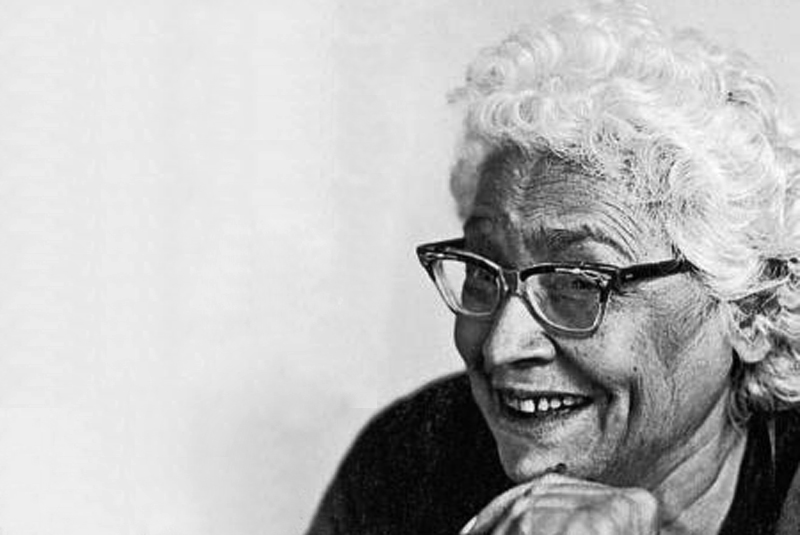With Saadat Hassan Manto, Rajendra Singh Bedi, and Krishan Chandar, Ismat Chughtai is considered the fourth most important fiction writer of Urdu. Her writings symbolise rebellion, compassion, a freshness in script combined with a realism in choice of themes for her writing. Ismat’s writing was centred on the woman, with all the manifestations of her gender, not only the typified patriarchial cylo, and object of subjugation and male desire. Ismat Chughtai was influenced by Rashid Jahan, who together with Sajjad Zaheer and Ahmad Ali had published a collection of stories called “Angare” in 1932, which was banned/confiscated by the Government. It was Rashid Jahan introduced Ismat to communism, and Ismat evolved from that mentoring.
Ismat versus the World
Taran Khan
December 11, 2015
BJP Government Purging Plurality and Diversity from Textbooks
My grandmother told me years ago that “Ismat apa“, as she always called the illustrious writer, wrote lying flat on her stomach, in the middle of a room buzzing with people. My grandparents were part of the great current of people who contributed to and were carried along by the Progressive Writers’ Movement in the 1940’s. While my grandfather was directly involved in literary production, my grandmother’s contributions were more tangential, and her observations rather pithy. She told me that she loved visiting Ismat apa’s home near Shivaji Park in Mumbai, a far trek from where she lived in Andheri. The windows of this house were always wide open, she recalled, and its curtains billowed all day in the sea breeze. From these observations I formed my own image of Ismat Chughtai, a woman of formidable achievement who wrote in an accessible voice. In my mind, she is the writer who wrote no matter what, belly down on a chatai (mat) on the floor, thriving on the bustle of the household around her. The prolific writer was in the news recently, when the Rajasthan government decided to drop her stories from school textbooks. It also removed poems and short stories by the late theatre activist and writer Safdar Hashmi.
In her life, Chughtai was adept at offending people. Her work dealt with taboo themes and took readers into places that had never before been described. She wrote in the ‘ghareloo zabaan’: the turns of phrases and idioms of her busy household, the gossip of inner courtyards and women’s quarters. I read her memoir Kaghazi Hai Pairahan (translated in English as A Life in Letters) as a college student. It was as transformative a text as other feminist tracts I encountered during those years, if not more so for the immediacy of its setting. Chughtai wrote in a style that was fearless, irreverent and often very funny. She began writing in the 1930s, but the story that defined her was Lihaaf (The Quilt), published in January 1942 in Adab-i-Latif, a literary magazine published from Lahore. The story earned her a court summons for obscenity, along with her friend Saadat Hasan Manto. They both chose to stand trial rather than apologize for their work, and eventually the cases were dropped.
Chughtai’s canon includes works like her novel Terhi Lakeer (The Crooked Line) and stories like Masooma, Chauthi ka Joda (The Wedding Dress) and Ziddi (The Stubborn Girl). The latter was adapted into a film script directed by her husband Shahid Latif. The duo collaborated on a host of other films including Arzoo (1950). Chughtai also wrote the dialogues for the 1978 film Junoon in which she played the role of a grandmother. And Chauthi ka Joda formed part of the story for the Partition classic Garam Hawa (1973), directed by MS Sathyu.
The years of student life are made special by exploration, by tuning into the abundance and diversity of nations, voices and realities. All this would be denied to the young minds who read the purged textbooks.
In every way, Chughtai stood for progressive values for most of her life. She had to fight for an education, first from the iconic Isabella Thoburn College in Lucknow and then to gain a Teachers Training degree from Aligarh. She went on to write books that challenged parochialism and patrirachy and championed the cause of social justice. She wrote for all of India, and almost 25 years after her death, she stands as a proud symbol of India’s syncretic values and her own compassionate humanity. So to weed her out of textbooks for schoolchildren is a self defeating move.
According to media reports, the reason for the removal of Chughtai and Hashmi’s writings is that “they were were loaded with Urdu words…” and were “highlighting practices of a particular community.” They are sought to be replaced by readings that promote “local cultural practices and beliefs”. This runs counter to the idea of Indian plural culture, that takes pride in its diversity. It also fails to understand the entire culture of reading, and of exploring different worlds through words, ideas and books. As a young woman in Aligarh, where Chughtai set many of her stories, I devoured translations of Chekhov and Maupassant, besides the writings of PG Wodehouse and Agatha Christie. It is limiting to think that reading should be about your own life or what is familiar. The years of student life are made special by exploration, by tuning into the abundance and diversity of nations, voices and realities. All this would be denied to the young minds who read the purged textbooks.
It is both sad and ironic that Chughtai’s works continue to fall foul of government diktats, decades after her trial by the British Crown, in the India of 2015. Perhaps the only sane response to this is what I imagine Ismat would have done: continue writing, in a room with the windows flung wide open, open to the breeze from all directions.
(The writer is a journalist based in Mumbai )

